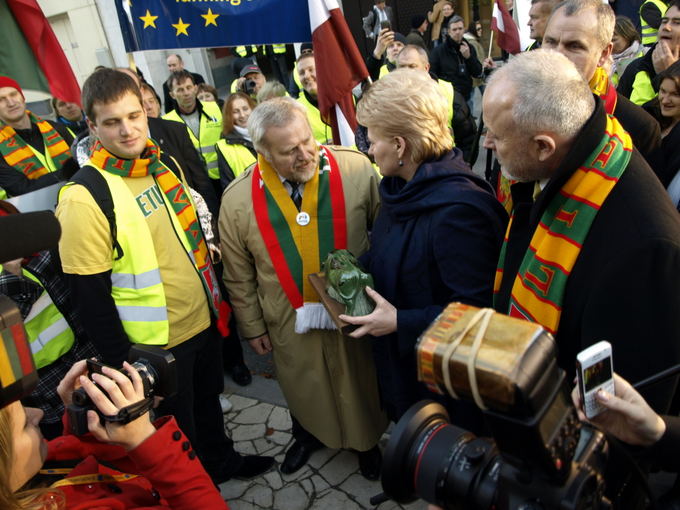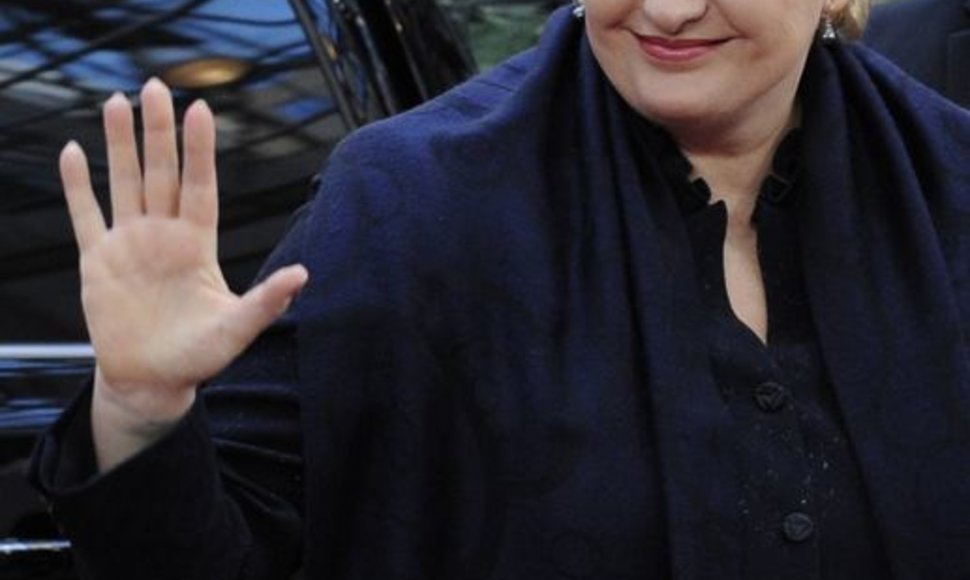Prior to the negotiations on the 2014-2020 EU budget, the president and heads of other states had individual meetings with European Council President Herman Van Rompuy and President of the European Commission, Jose Manuel Barroso.
After the meeting, Grybauskaitė said she would seek that direct payments to farmers reach the EU average faster, that strict constraints for structural support are not applied to Lithuania, and that adequate financial support for decommissioning of the Ignalina nuclear power plant, as foreseen in the Accession Treaty of Lithuania, is secured.
"Most importantly, we have to make sure that the overall level of support for the future seven-year period is not lower than we had in 2007-2013," the president said in a press release circulated by her press service.
In her words, Lithuania supports the objective to spend less; however, the budget cuts should not be made at the expense of economically weaker member states.
“In allocating EU funds, it is necessary to take account of the country-specific situation, observe the principle of justice, and enable member states to honor the commitments they have made," reads the press release.
"Austerity is ok. I am a former budget commissioner, so I am for austerity," Grybauskaitė told Brussels journalists.
The president also thanked the Lithuanian farmers who came to Brussels to protest in an effort to secure higher EU aid.
"I thank the farmers for their support. It is very important to have you here in Brussels. Lithuania has very difficult talks ahead of it about the long-term European Union budget. I wish everyone concentration, patience, and stamina in an effort to achieve the best result for our country," the president added.
The EU summit is intended to look for a compromise on the one-trillion-euro budget and kicks off with an official dinner on Thursday evening, where Van Rompuy is to propose a new budget draft.
Eight countries that make the largest contribution to the budget – Austria, Great Britain, Denmark, France, Finland, Germany, the Netherlands, and Sweden – united in their demand to cut spending, although they are far from united on what should be given up.
The British leaders have been particularly vocal in advocating for massive cuts in the EU budget, even hinting they would veto it, should the slashes be insufficient. Grybauskaitė, however, downplayed Britain's warnings, saying "the threats are more intended for the home market."
"What's there to comment on. The British have always been very strong-worded, versatile, and things in negotiations are later entirely different. This is my experience," Grybauskaitė told journalists in Brussels on Thursday.
Grybauskaite said the current situation somewhat resembled the earlier negotiations she attended in capacity as the EC member in charge of budget.
"I am not willing to comment, I saw the whole show five years ago, it is repeating and is intended for the public," the president said.
On the other side of the barricades are 15 countries that receive money, mainly from cohesion funds, which are intended to help the poorer regions to catch up with the richer areas. The line is the second-largest in the EU budget after the Common Agricultural Policy.
EU aid makes around a quarter of Lithuania's budget. And half of the support comes from structural funds, while the remainder is support for the agriculture sector.
The Baltic states have on numerous occasions spoken against proposals to cap EU structural funding by pegging it to the countries' GDP. Lithuania, Latvia, and Estonia have underlined that they should not be punished for painful austerity measures they took to deal with the recession and saw their GDP plummet in 2009.
Based on a draft proposal submitted last week, member states whose economy contracted more than 1 percent in 2008-2010 would see their EU aid ceiling increased by an as yet unidentified number, compared to the general rule stating that EU support cannot exceed 2.4 percent of GDP. The Baltic states and Hungary would fall into this category.
The Lithuanian president also plans to raise the issue of the funding of Ignalina's closure. Based on a recent proposal, Lithuania would get EUR 210 million for Ignalina's closure-related projects for 2014-2017. More than increasing the sum, what concerns Lithuania is that the 2017 deadline be dropped so it is able to ask for additional EU funding beyond the date.
“It is important for us to have no date at all or to have it for the whole period, with the possibility to extend it for the next financial period," Grybauskaitė told journalists after meeting with presidents of the European Commission and the European Council who should present the new 2014-2020 budget draft later on Thursday.
In Grybauskaitė's words, she has “a good backup” in the negotiations on Ignalina closure, as the date was not envisaged in the documents of Lithuania's EU accession.
She said that, regardless of Lithuania's ability to use merely about 60 percent of the money received for Ignalina closure, the current proposal is too small. In 2007-2013, EU provided 1.37 billion euros for the decommissioning.
"I must admit that Lithuania used merely about 50-60 percent of the money over the last financial perspective. Unfortunately, we stalled and missed a lot of time, but in any case, the sum of 210 million euros is very little,” Grybauskaitė said.
Under the proposal, Ignalina decommissioning projects would be granted 210 million euros in the 2014-2017 period. The new draft should be proposed on Thursday evening, with the talks continuing on Friday.
Lithuania estimates that it needs around 770 million euros for Ignalina plant's decommissioning until 2020 and a total of 1.5 billion euros until 2030.
 |
| Dalios Plikūnės nuotr. /Baltic farmers came to Brussels to demand equal pay. |















